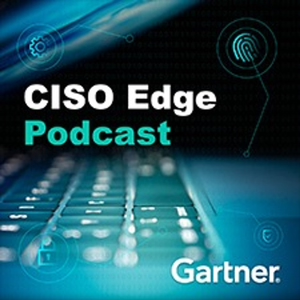
Empowering Growth Through Geopolitically Elastic Supply Chains
07/30/24 • 35 min
This episode explores:
- How, despite geopolitical instability, CSCOs can meet growing performance expectations by increasing their supply chain’s flexibility in key areas. (1:20)
- Definitions and applications of terminology associated with this process, such as “trust boundaries” and “supply chain elasticity.” (5:10)
- Concerns of increased complexity associated with supply chain elasticity. (8:30)
- Methods to assess geopolitical risks’ potential impacts on a supply chain. (13:18)
- Recommendations for CSCOs seeking to increase their supply chain’s elasticity. (16:35)
In this episode of the Supply Chain Podcast, host Lindsay Azim and guest Pierfrancesco (Pier) Manenti, research vice president for the Gartner supply chain strategy team, discuss findings from Supply Chain Executive Report: Empowering Growth Through Geopolitically Elastic Supply Chains.
As countries cloister their markets in response to various geopolitical tensions, accessing a global marketplace is becoming harder for CSCOs. Lindsay and Pier explore how “supply chain elasticity,” a concept explored in the Executive Report, can help CSCOs alleviate these market access issues while driving growth. The discussion includes key definitions and actions, success stories from organizations already applying these principles and recommendations for CSCOs to improve elasticity within their own supply chains.
Pierfrancesco (Pier) Manenti is research vice president for the Gartner supply chain strategy team. Pier provides insights and advisory support to chief supply chain officers (CSCOs) and heads of strategy of global manufacturing and retail corporations, especially with regards to future trends and key challenges affecting end-to-end supply chain strategy. He focuses on strategic transformation, digitalization, agility and design for profitability.
This episode explores:
- How, despite geopolitical instability, CSCOs can meet growing performance expectations by increasing their supply chain’s flexibility in key areas. (1:20)
- Definitions and applications of terminology associated with this process, such as “trust boundaries” and “supply chain elasticity.” (5:10)
- Concerns of increased complexity associated with supply chain elasticity. (8:30)
- Methods to assess geopolitical risks’ potential impacts on a supply chain. (13:18)
- Recommendations for CSCOs seeking to increase their supply chain’s elasticity. (16:35)
In this episode of the Supply Chain Podcast, host Lindsay Azim and guest Pierfrancesco (Pier) Manenti, research vice president for the Gartner supply chain strategy team, discuss findings from Supply Chain Executive Report: Empowering Growth Through Geopolitically Elastic Supply Chains.
As countries cloister their markets in response to various geopolitical tensions, accessing a global marketplace is becoming harder for CSCOs. Lindsay and Pier explore how “supply chain elasticity,” a concept explored in the Executive Report, can help CSCOs alleviate these market access issues while driving growth. The discussion includes key definitions and actions, success stories from organizations already applying these principles and recommendations for CSCOs to improve elasticity within their own supply chains.
Pierfrancesco (Pier) Manenti is research vice president for the Gartner supply chain strategy team. Pier provides insights and advisory support to chief supply chain officers (CSCOs) and heads of strategy of global manufacturing and retail corporations, especially with regards to future trends and key challenges affecting end-to-end supply chain strategy. He focuses on strategic transformation, digitalization, agility and design for profitability.
Previous Episode

Generative AI in Cybersecurity — Innovation or Distraction?
Join Gartner experts Chris Mixter and Jeremy D’Hoinne on this episode of the CISO Edge Podcast for a conversation on the steps that CISOs must take to fulfill their multiprongmandate: defending the enterprise from AI-fueled attacks, and enabling business and cybersecurity functional use of generative AI (GenAI) — all without losing focus on their other mission-critical priorities.
This episode explores:
- Is generative AI simply a version of a movie CISOs have seen before? (02:32)
- What are the most promising use cases for generative AI within cybersecurity? (6:48)
- How do we avoid inflated expectations around secure development in the GenAI era? (12:29)
- What are the key skills and cybersecurity culture we need to make the most of GenAI? (17:25)
As a Gartner research VP for security operations and infrastructure protection, Jeremy D'Hoinne assists chief information security officers and their teams to develop strategies to protect against advanced threats. Jeremy’s research includes exposure management and how to run a continuous threat exposure management (CTEM) program; it also covers related technologies, such as cybersecurity validation technologies,including breach and attack simulation (BAS). He also studies the intersection of artificial intelligence and cybersecurity with a focus on the disruptions caused by large language models and generative AI.
Next Episode

How CISOs Can Try Cyber Deterrence
Join Gartner experts Chris Mixter and Will Candrick on this episode of the CISO Edge Podcast to learn how to implement a capability that many cybersecurity organizations see as beyond their program’s abilities or too risky to attempt: cyber deterrence.
- Why now is the time to explore cyber deterrence. (2:41)
- Where deterrence fits into your cybersecurity program. (12:15)
- Bad actors are rational and you can use that against them (16:39)
- Introducing the Gartner PARC Framework for prioritizing deterrence tactics. (20:39)
- How deterrence contributes to cybersecurity team engagement. (28:25)
This podcast explores research found in
CISO Edge: Use Cyber Deterrence to Stop Attacks Before They Start
Will Candrick is a Senior Director Analyst within Gartner’s risk and security management group. Will brings extensive experience researching cybersecurity management challenges, and regularly advises CISOs and their teams on maturing security and risk practices. In particular, Will focuses on cybersecurity strategic planning, incident response, awareness, metrics, board reporting and policies. Before Gartner, Will held research roles at CEB researching management best practices for CISOs and their teams. Will has a bachelor’s degree in economics with a concentration in political economy from Carleton College.
If you like this episode you’ll love
Episode Comments
Generate a badge
Get a badge for your website that links back to this episode
<a href="https://goodpods.com/podcasts/ciso-edge-the-gartner-cybersecurity-podcast-346755/empowering-growth-through-geopolitically-elastic-supply-chains-65205724"> <img src="https://storage.googleapis.com/goodpods-images-bucket/badges/generic-badge-1.svg" alt="listen to empowering growth through geopolitically elastic supply chains on goodpods" style="width: 225px" /> </a>
Copy




